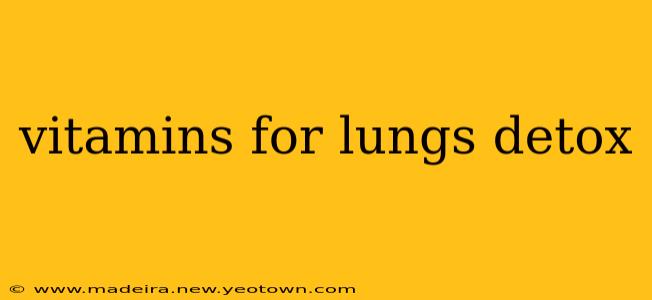Our lungs, the tireless engines of our respiration, are constantly battling against environmental pollutants, allergens, and the natural byproducts of our own metabolism. While the term "lung detox" isn't a medically recognized term, supporting your lungs' natural cleansing mechanisms is crucial for optimal respiratory health. This isn't about a quick fix; it's about long-term, sustainable support for your body's remarkable self-healing capabilities. Think of it as nurturing your lungs, rather than aggressively "detoxing" them.
This journey starts with understanding the key vitamins and nutrients that play a vital role in supporting lung function and overall respiratory well-being. It's a story of empowerment, focusing on proactive choices that can contribute significantly to a healthier respiratory system.
What Vitamins Are Good for Lung Health?
The reality is, there's no magic bullet vitamin for instantly "detoxing" your lungs. However, several vitamins and nutrients are critical for supporting healthy lung function and mitigating the effects of environmental stressors.
Vitamin C: This powerful antioxidant is a frontline defender against free radicals—unstable molecules that damage cells. Think of it as a tiny superhero battling the harmful effects of pollution and smoke. Vitamin C also aids in collagen production, essential for maintaining the structure and integrity of lung tissue. Sources include citrus fruits, berries, and leafy greens.
Vitamin E: Another crucial antioxidant, Vitamin E protects lung cells from oxidative damage, reducing inflammation and potentially protecting against respiratory illnesses. Good sources include nuts, seeds, and vegetable oils.
Vitamin D: While not directly involved in lung detoxification, Vitamin D plays a surprising role in respiratory health. Studies suggest it can help reduce inflammation and improve lung function. Sunlight is the best source, but supplements can be necessary, especially in colder climates.
Selenium: This trace mineral possesses potent antioxidant properties. It combats oxidative stress and helps support the body's natural defense mechanisms against respiratory infections. Brazil nuts are exceptionally rich in selenium.
Beta-Carotene: This precursor to Vitamin A is a strong antioxidant that may help protect against lung damage from pollution. Carrots, sweet potatoes, and spinach are excellent sources.
Do Vitamins Help Clean Your Lungs?
While vitamins don't directly "clean" your lungs in the sense of removing toxins like a filter, they significantly contribute to their overall health and function. By strengthening your body's natural defense mechanisms against oxidative stress and inflammation, they indirectly support the lungs' ability to cope with and clear irritants.
Can You Detox Your Lungs Naturally?
Yes! A holistic approach that combines a healthy diet rich in the vitamins and nutrients mentioned above, alongside lifestyle modifications, is the most effective way to support your lungs naturally. This includes:
- Quitting Smoking: This is paramount. Smoking is the single biggest threat to lung health.
- Avoiding Air Pollution: Minimize exposure to polluted air, especially during peak pollution periods.
- Regular Exercise: Keeps your lungs strong and improves overall cardiovascular health.
- Staying Hydrated: Drinking plenty of water helps thin mucus and makes it easier to clear from your lungs.
What Foods Help Detox Your Lungs?
The best foods for lung health are those rich in the vitamins and nutrients discussed earlier. Focus on a diet full of fruits, vegetables, nuts, seeds, and whole grains. Specifically, consider incorporating foods like:
- Berries: Rich in Vitamin C and antioxidants.
- Leafy Greens: Packed with Vitamin C, Vitamin E, and other beneficial nutrients.
- Sweet Potatoes: Excellent source of beta-carotene.
- Brazil Nuts: High in selenium.
- Citrus Fruits: Abundant in Vitamin C.
Are There Any Specific Lung Detox Drinks?
There's no scientific evidence supporting the claim that specific drinks magically detoxify your lungs. However, drinking plenty of water is essential for overall health and aids in clearing mucus from your respiratory system. Herbal teas, such as chamomile or ginger tea, may provide some soothing relief for respiratory irritation. However, it’s crucial to remember that these are supportive measures, not a replacement for proper medical care.
Disclaimer: This article is for informational purposes only and does not constitute medical advice. Consult with a healthcare professional before making any changes to your diet or supplement regimen, especially if you have underlying health conditions. This information should not be considered a substitute for professional medical advice, diagnosis, or treatment. Always seek the advice of your physician or other qualified health provider with any questions you may have regarding a medical condition.

